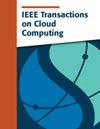通过纳米服务集成保护和维持物联网边缘计算架构
IF 5
2区 计算机科学
Q1 COMPUTER SCIENCE, INFORMATION SYSTEMS
引用次数: 0
摘要
物联网(IoT)和边缘计算设备的快速扩散需要提供低延迟、能效和强大安全性的解决方案,而这些解决方案往往难以同时实现平衡。本文介绍了一种新的基于纳米服务的框架,该框架可以动态适应不断变化的需求,同时实现可持续和安全的边缘操作。通过将功能分解为专门的、范围狭窄的纳米服务(仅在需要时请求,空闲时消除),与传统的、更静态的方法相比,该方法显著降低了延迟和能耗。此外,集成零信任架构(Zero-Trust Architecture, ZTA)确保每个组件(计算或安全相关)都通过严格的访问控制和微分段得到持续验证和限制。该框架的适应性统一扩展到所有纳米服务,包括那些提供安全特性的纳米服务,从而即使在工作负载和网络条件发生变化时也能保持强大的保护措施。在不同工作负载下对物联网设备进行的实验评估表明,该方法在保持安全性和可扩展性的同时显著降低了能耗和延迟。这些结果强调了一个集成的、灵活的模型的潜力,该模型可以同时解决能源效率、性能和安全问题,这是未来边缘计算环境中必不可少的三要素。本文章由计算机程序翻译,如有差异,请以英文原文为准。
Securing and Sustaining IoT Edge-Computing Architectures Through Nanoservice Integration
The rapid proliferation of the Internet of Things (IoT) and edge computing devices calls for solutions that deliver low latency, energy efficiency, and robust security—often challenging goals to balance simultaneously. This paper introduces a novel nanoservice-based framework that dynamically adapts to changing demands while achieving sustainable and secure edge operations. By breaking down functionalities into specialized and narrowly scoped nanoservices that are requested only as needed and eliminated when idle, the approach significantly reduces latency and energy usage compared to conventional, more static methods. Moreover, integrating a Zero-Trust Architecture (ZTA) ensures that every component—computational or security-related—is continuously verified and restricted through strict access controls and micro-segmentation. This framework’s adaptability extends uniformly to all nanoservices, including those providing security features, thereby maintaining strong protective measures even as workloads and network conditions evolve. Experimental evaluations on IoT devices under varying workloads demonstrate that the proposed approach significantly reduces energy consumption and latency while maintaining security and scalability. These results underscore the potential for an integrated, flexible model that simultaneously addresses energy efficiency, performance, and security—an essential trifecta in future edge computing environments.
求助全文
通过发布文献求助,成功后即可免费获取论文全文。
去求助
来源期刊

IEEE Transactions on Cloud Computing
Computer Science-Software
CiteScore
9.40
自引率
6.20%
发文量
167
期刊介绍:
The IEEE Transactions on Cloud Computing (TCC) is dedicated to the multidisciplinary field of cloud computing. It is committed to the publication of articles that present innovative research ideas, application results, and case studies in cloud computing, focusing on key technical issues related to theory, algorithms, systems, applications, and performance.
 求助内容:
求助内容: 应助结果提醒方式:
应助结果提醒方式:


